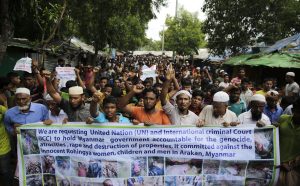It was six years ago today, on August 25, 2017, that the Myanmar military poured into Rakhine State and unleashed unimaginable violence on my people, the Rohingya. Over the course of a few weeks, soldiers and their proxies killed thousands of women, men, and children, burned whole villages to the ground, and drove close to 800,000 people to flee into Bangladesh.
It is a source of shame for the world that six years later, not only do the Rohingya remain a people on the brink of extinction, but the architects of the genocide against us remain in power in Myanmar. Despite this, Rohingya and the people of Myanmar have largely been forgotten on the world stage, with other crises dominating global headlines. It is now high time that the world takes action to end the genocide against the Rohingya, starting with supporting the international justice efforts.
The deadly violence in August 2017 was the culmination of a decades-long effort by the Myanmar government and military to erase the Rohingya as a people. Rohingya live in ghetto-like conditions in Rakhine State, where a spate of dehumanizing laws and policies prevent us from accessing healthcare, education, and the labor market. I myself had to flee Rakhine State in the early 1990s since I was not allowed to go to university just because I was a Rohingya. Before 2017, military-led violent campaigns against the Rohingya in 1978, the early 1990s, and 2016 had also driven hundreds of thousands to flee.
We Rohingya have known for a long time that the only way to describe what we are facing is as the “crime of crimes”: genocide. Thankfully, the world is finally starting to catch up. In March 2022, the U.S. government officially declared that the Myanmar military has committed “genocide and crimes against humanity against Rohingya.” Tom Andrews, the United Nations’ top human rights expert on Myanmar, has similarly condemned attacks on Rohingya as “genocide,” while the U.N.’s top judicial body – the International Court of Justice (ICJ) in the Hague – has ordered Myanmar to end its genocidal practices.
Six years after the events of 2017, Rohingya teeter on the brink of extinction. Close to 1 million Rohingya live as refugees in Bangladesh’s southern Cox’s Bazar district, where they huddle in overcrowded camps with few prospects for building a dignified future. While Bangladesh has generously opened its doors to Rohingya who were quite literally fleeing for their lives, the government has also continued to restrict refugees’ access to education and the labor market. Recent aid cuts will also have a devastating effect on the refugee population.
Inside Myanmar, some 600,000 Rohingya live in a de facto open-air prison. Rohingya are largely confined to their villages, unable to go to hospitals, schools or to seek employment. The military coup in Myanmar in February 2021 has further added to the uncertainty. The junta has launched a brutal war against its own people, killing thousands and dismantling nascent democratic institutions. In Rakhine State, Rohingya have been targeted by both soldiers and the ethnic armed groups fighting against them.
There is a ray of hope for Rohingya, however, in the international justice efforts that have been gaining steady momentum in recent years. In 2019, the International Criminal Court launched an investigation against the Myanmar military for crimes against humanity against the Rohingya. The same year, the ICJ began a genocide trial against the Myanmar civilian and military leadership; that trial finally received the green light to go ahead last year, after Myanmar’s last desperate attempts to derail it were overruled.
My own organization, Burmese Rohingya Organisation UK (BROUK), has also successfully petitioned the Argentinean judiciary to open a universal jurisdiction case against the Myanmar military. Progress has been remarkable since the case was accepted in 2021. In June this year, we were able to bring seven Rohingya victims, one man and six women, who had survived sexual violence and other atrocities to Buenos Aires to testify. It was the first time ever that those exposed to the 2017 violence had appeared before a court of law anywhere in the world.
We have now gathered strong judicial evidence and perpetrators could be soon targeted. The court also wants to examine the impact of social media in disseminating hate speech in the context of the genocide, and has sent a formal request to Facebook for more information.
I cannot stress enough that we are fighting not just for justice for the Rohingya, but for everyone in Myanmar suffering under the military.
Rohingya now need the world’s help more than ever. International governments must pressure the military to end the genocide by any means possible. A key first step is to broaden the sanctions imposed on Myanmar, and in particular to target the economic interests of the military. Governments must also support international justice efforts in any way they can, by for example opening their own universal jurisdiction cases. Canada, Germany, the Netherlands, and the U.K. have also shown real moral leadership by formally backing the ICJ genocide case.
Six years after the vicious violence in 2017, Rohingya are still facing a genocide while Myanmar is being destroyed by a callous military junta. This is something the world must not forget.

































